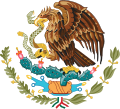During multiple conflicts between Israel and Palestine, Mexico has remained neutral and has asked that both parties cease fighting and continue with the peace process. [4]
Development of diplomatic relationship status
In August 1975, Mexican President Luis Echeverría met with head of the Palestine Liberation Organization (PLO), Yasser Arafat, in Alexandria, Egypt and the Mexican government soon established diplomatic relations with the PLO. [7] [8] That same year, the PLO opened an 'Information office' in Mexico City, which was elevated to a 'Special Delegation office' in 1995 after the Second Oslo Accord. [9]
In 2005, Mexico opened a representative office in Ramallah. [8] In 2011, Mexico abstained from the vote that allowed Palestine to become a member of UNESCO. [10] In 2012, Mexico voted in favor of Palestine becoming a non-memberobserver state at the United Nations General Assembly, an upgrade from non-state observer. [11] [12]
In July 2021, the Senate of Mexico made a statement urging the Mexican government to recognize the State of Palestine. [13] In November 2022, the Board of Directors of the Senate of Mexico asked the Secretariat of Foreign Affairs to take steps to recognize the State of Palestine. [14]
On 2 June 2023, it was announced from the Palestinian end that the Palestinian Special Delegation office in Mexico City was being elevated to the rank of Embassy as of the previous day, without commenting on the Mexican government's position regarding the change. [15] The Mexican government's website of diplomatic missions was updated to reflect this reclassification, with many sources claiming this move had amounted to implicit recognition, by Mexico, of Palestinian statehood. [16] [17] At least one source would later credit Mexican president Andrés Manuel López Obrador with having affected the change., [18] and Mexico would be listed in documents circulated at the United Nations in 2024 as having recognized Palestine on 2 June 2023. [19]
In a press release from 25 April 2024, the Mexican government stated that "Mexico has supported actions in several multilateral forums that have, among others, the legal effect of recognizing Palestine as a State.", [20] and on 11 October 2024 Mexican President Claudia Sheinbaum said "we believe that the Palestinian State should be recognized in its full scope, just like the State of Israel." [21]
On 5 February 2025 Sheinbaum stated that "Mexico has had a position since years ago, not only of the governments of the Fourth Transformation, but it comes from before, of recognition of the State of Palestine and at the same time of the State of Israel. So that is the policy of the Mexican government of years ago and of now." [22]
Some media outlets reported that Mexico recognized Palestine on 19 March 2025, [23] in reference to the accreditation ceremony for the first Palestinian representative to Mexico under the title of "Ambassador". [18]
Diplomatic visits and honors
In June 2000, Mexican Foreign Minister Rosario Green paid an official visit to Gaza City and Ramallah. [8] During her visit, Foreign Minister Green met with President of the Palestinian National Authority, Yasser Arafat, and conveyed to him the message sent by Mexican President Ernesto Zedillo formally inviting Arafat to Mexico. [24] Foreign Minister Green also met with the Minister for Planning and International Cooperation.
In 2009, Foreign Minister Riyad al-Maliki paid a visit to Mexico, becoming the first Palestinian foreign minister to do so. [8]
In June 2011, a statue of former President of the Palestinian National Authority, Yasser Arafat, was unveiled in Mexico City. [25] In 2013, the Mexican Congress installed a section in its building to 'Mexico-Palestine Friendship'. [7]
In December 2018, Foreign Minister Riyad al-Maliki paid a visit to Mexico to attend the inauguration for Mexican President Andrés Manuel López Obrador. [26]





